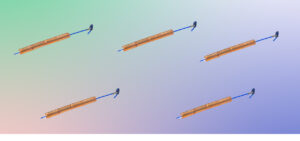
TLDR… what’s the lowdown?
- Relying on your body not to ovulate whilst breastfeeding and using this for contraception is called the Lactational Amenorrhoea Method (LAM)
- The LAM method is considered to be 98% effective, similar to contraceptive methods like the pill
- You will have to follow a few guidelines if you want to use breastfeeding as contraception:
- Your baby is less than six months old
- You are exclusively (or almost exclusively) breastfeeding day and night
- Your periods have not returned
✔️ If you think you’ll find this blog informative, make sure to check out our newsletter for more:
One of the lesser-known benefits of breastfeeding is that it can be a form of contraception. Cool, right? So whilst you might not want to jump straight back into bed after having a baby, breastfeeding can give your body a break from other forms of contraception for up to six months.
Whilst it can be a remarkable 98% effective, breastfeeding as contraception does come with some essential criteria you have to meet (more on this later) if you are to use it as contraception.
Read on to get the lowdown on the Lactational Amenorrhoea Method and find out if it’s the method for you.
Why does breastfeeding prevent pregnancy?
If you are exclusively breastfeeding, the hormones produced mean the body naturally stops ovulating, and when you’re not ovulating, you can’t get pregnant.
Is breastfeeding a reliable form of contraception?
Relying on your body not to ovulate whilst breastfeeding and using this for contraception is called the rather technical term, Lactational Amenorrhoea Method (LAM). It can be a highly reliable form of contraception, but (and this is a big but) there are a few guidelines that you will have to follow if you want to use breastfeeding as a method of contraception.
The main three criteria for LAM are:
- Your baby is less than six months old
- You are exclusively (or almost exclusively) breastfeeding day and night
- Your periods have not returned
If all these conditions are met, the LAM method is considered 98% effective, similar to well known contraceptive methods like the pill. When the LAM criteria no longer apply you can continue breastfeeding but must switch to an effective method of contraception if you do not wish to become pregnant.
What factors may make breastfeeding as a contraceptive less effective?
If you’re not looking to get pregnant again almost straight away after giving birth (we don’t blame you), it’s crucial to consider the factors that may increase your risk of pregnancy if you are using the LAM method, meaning you should switch to an effective method of contraception. These include:
- The baby feeding less regularly and taking longer intervals between feeds
- The introduction of supplements to breastmilk such as formula, juice or solids
- Using a dummy as a comforter
- Illness, stress or anxiety with the mother or baby
- When the mother is expressing milk
- When the baby is six months old
- When menstruation returns
If you’re unsure whether the LAM method would work for you, why not book a consultation with one of our GPs to discuss it further.
What contraception can you use while breastfeeding?
If you have your baby in the hospital, a midwife or birth worker will often discuss contraception with you before you go home. This is because it is possible to get pregnant as soon as three weeks after giving birth. If you miss speaking with your midwife, your GP or health visitor should be on hand to discuss your options. Our in-house GPs at The Lowdown are also a friendly ear to discuss any contraception questions you might have postpartum. You can book a GP consultation here.
There are various methods of contraception you can use after giving birth, but it’s important to note that with some, you will have to wait longer to start after giving birth or if you’re breastfeeding.
Options for contraception whilst breastfeeding
It is ok to use the following contraception options when breastfeeding and immediately after birth:
- The progestogen-only pill
- Male and female condoms
- The contraceptive implant
- The contraceptive injection
- The hormonal coil (IUS) – must be inserted within 48 hours of birth
- The copper coil (IUD) – must be inserted within 48 hours of birth
Contraceptives you can use at three weeks after birth (only if you’re NOT breastfeeding)
Contraceptives you can use at six weeks after birth (if you are breastfeeding)
What effect does breastfeeding have on contraception?
Whilst you are breastfeeding, the fertility signs associated with ovulation will often be reduced and ovulation may not occur regularly. This can make fertility awareness based methods of contraception unreliable and you may want to consider other options whilst breastfeeding.
Breastfeeding can also affect the risk of a coil going through the uterus wall (perforating). The risk of perforation after any coil insertion is usually around 1-2 in 1000, but this can be increased by as much as six times if you are breastfeeding. Now bear with us whilst we get a bit more technical here, but if we break this down with timings, the risk is 5.6 in 1000 during the first 36 weeks after delivery and 1.6 in 1000 over 36 weeks after delivery (basically back to the standard risk). So some may choose to wait.
Healthcare practitioners may advise against breastfeeding for around three hours after a coil insertion. This isn’t based on any particular guidance but is due to breastfeeding releasing a hormone that can contract the uterus and possibly increase the risk of expulsion or perforation.
We still love the coil at The Lowdown, but also believe you need to be fully informed about all of this and speak with your doctor to make your own decision.
What effect does hormonal contraception have on breastfeeding?
Current research shows that progestogen-only contraceptive methods do not affect milk supply or your baby’s growth or development. But whilst this research is clear, the information for the combined hormonal pill is less clear, with concerns that the oestrogen may reduce breast milk supply – especially if it is started within six weeks after delivery.
There have been extensive reviews examining these studies, which determine that the research isn’t high enough quality and may have been affected by data from women who were using old fashioned types and doses of the combined pill. At The Lowdown, we’re confident that the research shows your baby’s growth and development isn’t affected by the combined pill – so if your baby is more than six weeks old and it’s your number one choice while breastfeeding and safe for you, then go ahead.
How soon after birth can you get pregnant?
It is possible to get pregnant as soon as three weeks or 21 days after birth.
Can I take emergency contraception while breastfeeding?
Yes. If you do not meet the criteria for LAM you may want to consider emergency contraception following unprotected sex.
The morning after pill, Levonelle is one of the more common brands of emergency contraception. Whilst a small amount of hormones from the pill may pass into breast milk, it is not harmful to your baby.
EllaOne is another common morning-after pill but it’s safety during breastfeeding has not been studied. It is therefore advised to avoid breastfeeding for a week after using ellaOne and milk should be expressed and discarded during that time. Check out this piece, where we discuss everything you need to know about the morning-after pill.
The copper IUD is the most effective form of contraception and women may want to consider this whilst they are breastfeeding, taking into account the small increased risk of perforation and depending on suitability.
Check out our very own Dr Fran’s blog where she spills the T on contraception after giving birth (before heading off on maternity leave *sad face*).
Tags
Hatty is a freelance digital marketing consultant with over 10 years experience. You can view Hatty’s personal portfolio here.












